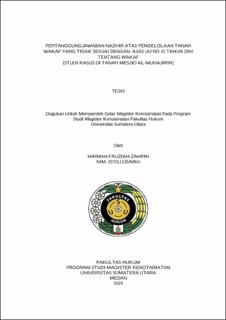| dc.contributor.advisor | Thaib, M Hasballah | |
| dc.contributor.advisor | Thaib, Zamakhsyari Bin Hasballah | |
| dc.contributor.advisor | Barus, Utary Maharany | |
| dc.contributor.author | Zahrin, Hikmah Fauziah | |
| dc.date.accessioned | 2025-02-17T02:58:45Z | |
| dc.date.available | 2025-02-17T02:58:45Z | |
| dc.date.issued | 2024 | |
| dc.identifier.uri | https://repositori.usu.ac.id/handle/123456789/101326 | |
| dc.description.abstract | A waqf trustee hears a significant responsibility for managing waqf land, as stipulated in Law No. 41 of 2004 on Wauf. Waqf plays a vital role in society, impacting social, economic, and religious domains. This study focuses on the land of Al-Muhajirin Mosque as the object of the study, highlighting the complexity and challenges that a waqf trustee encounters in fulfilling his duties according to the principles outlined in the law of waqf. This study examines the implementation of the principles of legal responsibility for the waqf trustee who manages the waqf land, with reference to Law No. 41 of 2004 on Waaf and Islamic Law. It also explores the challenges a waqf trustee may encounter in fulfilling his responsibilities in waqf land management according to Law No 41 of 2004 on Waqf, and the sanctions imposed on the waqf trustee who fails to comply with his duties stipulated by the law.
A normative legal study (normative juridical) with a descriptive-analytical approach serves as the research methodology. The data sources mainly consist of secondary data, incorporating primary legal materials, secondary legal materials, and tertiary legal materials. These are collected by conducting library research and field research which is a systematic methodology to facilitate direct data collection from the field.
The study finds that a waqf trustee must adhere to the responsibilities stipulated in Law No. 41 of 2004 and the principles of Islamic Law. A waaf trustee is obliged to carry out his duties carefully in accordance with the law and social norms. However, challenges such as the unauthorized appointment of the chair of Mosque Prosperity Body (BKM) and inadequate human resources at Al-Muhajjirin Mosque may impede efficient waqf management. Sanctions imposed on the waqf trustee who breaches the obligation may include warnings, revocation of mandate, or administrative sanctions such as fines. Error in waqf management can lead to a serious consequence due to the entrusted assets to him. | en_US |
| dc.language.iso | id | en_US |
| dc.publisher | Universitas Sumatera Utara | en_US |
| dc.subject | Waqf Trustee | en_US |
| dc.subject | Land Management | en_US |
| dc.subject | Waqf | en_US |
| dc.title | Pertanggungjawaban Nazhir Atas Pengelolaan Tanah Wakaf yang Tidak Sesuai dengan Asas UU No 41 Tahun 2004 Tentang Wakaf (Studi Kasus di Tanah Mesjid Al-Muhajirin) | en_US |
| dc.title.alternative | Nazhir's Responsibility for Management of Waqf Land that is Not in Accordance with the Principles of Law No. 41 of 2004 concerning Waqf (Case Study on Al-Muhajirin Mosque Land) | en_US |
| dc.type | Thesis | en_US |
| dc.identifier.nim | NIM207011135 | |
| dc.identifier.nidn | NIDN0014017501 | |
| dc.identifier.kodeprodi | KODEPRODI74102#Kenotariatan | |
| dc.description.pages | 120 Pages | en_US |
| dc.description.type | Tesis Magister | en_US |
| dc.subject.sdgs | SDGs 16. Peace, Justice And Strong Institutions | en_US |


